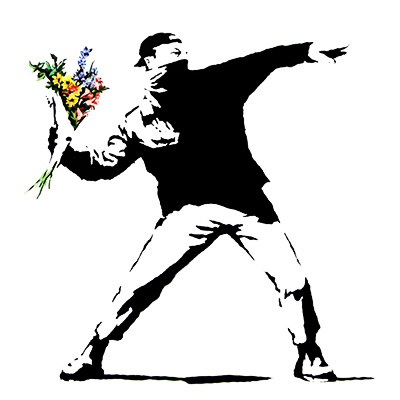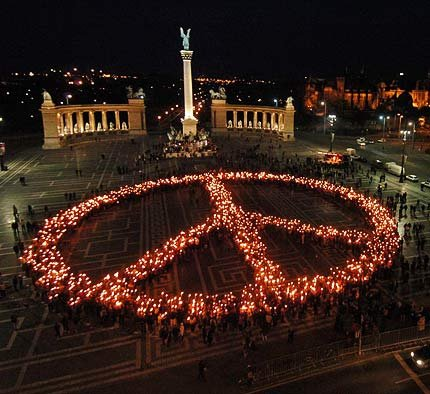Peaceful Resistance
I support peaceful resistance.
Blah, blah, blah, whatever. A lot of people do; the idea of resisting without violence is not a new one.
I'm only posting about this because I know a lot of people who oppose peaceful resistance for their own reasons, and to be honest I have to admit I'm scared.
I'm scared because as much as I care about peaceful resistance, I doubt a lot of things and I'm keenly aware that I might be very, very wrong. I'm keenly aware that I might be oppressing people more with my refusal to take up arms against others, and I'm also keenly aware that violence is violence - that no matter who's beating whom up, someone is going to suffer. It's a point I'll return to very soon.
So here's my rationale for resisting peacefully - and if I'm wrong please rip me a new one.
My problem with violent resistance is the same problem I have with war: both assume that by putting more suffering into a system, you can end the suffering. In fact, you can't - we've been warring and resisting violently for thousands of years and it's pretty doubtful how much good that's done. Incidentally, violence also rips communities apart and perpetuates suffering, no matter who does it - a fact people seem to overlook. Claiming to be on the side of the good and the right won't help soothe the grief of the friends and loved ones left behind when someone kills them for the sake of the glorious struggle.
You might argue that peaceful resistance doesn't work - in which case, I'd like to take a look at the track record of violent resistance generally. A lot of it hasn't worked all that well, and peaceful resistance is comparatively rare. Besides, there are plenty of ways to resist non-violently, and they generally fall under the category of disruption. If people deliberately refuse to carry out vital tasks - if they deliberately exclude governments and corporations from their daily lives - bam, governments and corporations suddenly weakened. The reason it's not working right now is that a lot of people aren't doing it - if a critical mass of people disrupt the system, probably a very large majority, that would work better than the same amount of people making war on the government to achieve change.
You might also argue that peaceful resistance is somehow weak. I don't think there are many people who would openly argue this, though I'd wager that the notion of weakness is a reason why people advocate beating the shit out of each other as an effective problem-solving method.
I don't think peaceful resistance is weak; I don't think any kind of resistance is weak. I think it takes a lot of strength, too, to refrain from causing more suffering through violence and instead try a more painless method. (I should state here now that for me, peaceful resistance doesn't mean, as a lot of people think it does, passively submitting when someone kicks you in the face. It means that violence is a last resort and only in self-defence.)
And finally, you might argue that sometimes a couple of deaths are necessary to save more people.
This is an argument I have a lot of trouble with, because I find it utterly despicable. There are relatively few situations where you have to do this. Most of the time it can be avoided.
There is nothing that uniquely marks people out as having to die; apart from genocide, I'm not sure anything warrants murder. There is nothing that can offset the suffering of those left behind, either. Not even your glorious new age of freedom and compassion can make the killing of another a necessary evil.
Blah, blah, blah, whatever. A lot of people do; the idea of resisting without violence is not a new one.
I'm only posting about this because I know a lot of people who oppose peaceful resistance for their own reasons, and to be honest I have to admit I'm scared.
I'm scared because as much as I care about peaceful resistance, I doubt a lot of things and I'm keenly aware that I might be very, very wrong. I'm keenly aware that I might be oppressing people more with my refusal to take up arms against others, and I'm also keenly aware that violence is violence - that no matter who's beating whom up, someone is going to suffer. It's a point I'll return to very soon.
So here's my rationale for resisting peacefully - and if I'm wrong please rip me a new one.
My problem with violent resistance is the same problem I have with war: both assume that by putting more suffering into a system, you can end the suffering. In fact, you can't - we've been warring and resisting violently for thousands of years and it's pretty doubtful how much good that's done. Incidentally, violence also rips communities apart and perpetuates suffering, no matter who does it - a fact people seem to overlook. Claiming to be on the side of the good and the right won't help soothe the grief of the friends and loved ones left behind when someone kills them for the sake of the glorious struggle.
You might argue that peaceful resistance doesn't work - in which case, I'd like to take a look at the track record of violent resistance generally. A lot of it hasn't worked all that well, and peaceful resistance is comparatively rare. Besides, there are plenty of ways to resist non-violently, and they generally fall under the category of disruption. If people deliberately refuse to carry out vital tasks - if they deliberately exclude governments and corporations from their daily lives - bam, governments and corporations suddenly weakened. The reason it's not working right now is that a lot of people aren't doing it - if a critical mass of people disrupt the system, probably a very large majority, that would work better than the same amount of people making war on the government to achieve change.
You might also argue that peaceful resistance is somehow weak. I don't think there are many people who would openly argue this, though I'd wager that the notion of weakness is a reason why people advocate beating the shit out of each other as an effective problem-solving method.
I don't think peaceful resistance is weak; I don't think any kind of resistance is weak. I think it takes a lot of strength, too, to refrain from causing more suffering through violence and instead try a more painless method. (I should state here now that for me, peaceful resistance doesn't mean, as a lot of people think it does, passively submitting when someone kicks you in the face. It means that violence is a last resort and only in self-defence.)
And finally, you might argue that sometimes a couple of deaths are necessary to save more people.
This is an argument I have a lot of trouble with, because I find it utterly despicable. There are relatively few situations where you have to do this. Most of the time it can be avoided.
There is nothing that uniquely marks people out as having to die; apart from genocide, I'm not sure anything warrants murder. There is nothing that can offset the suffering of those left behind, either. Not even your glorious new age of freedom and compassion can make the killing of another a necessary evil.


Comments
Post a Comment